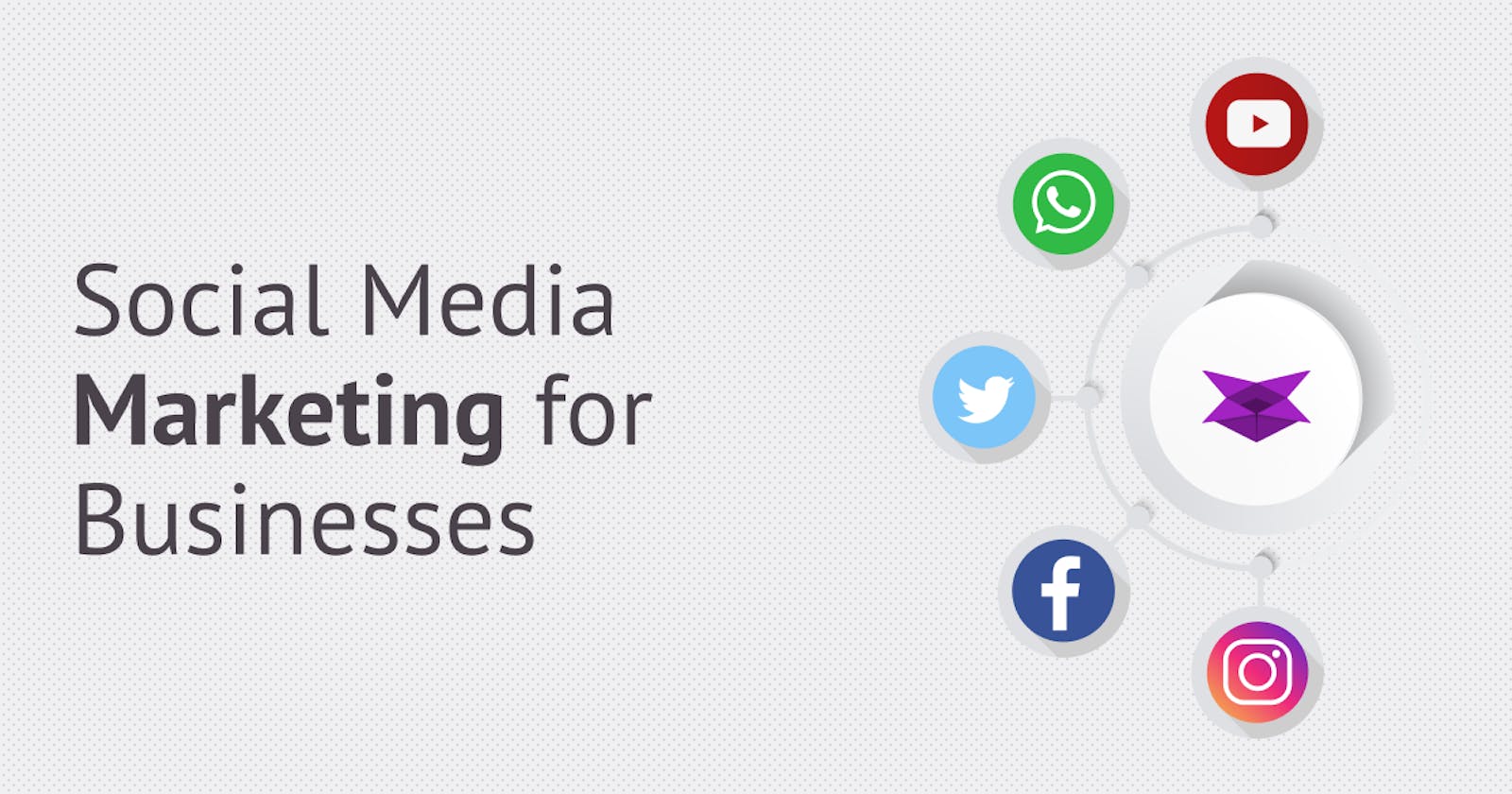Social Media Marketing Tips for Businesses
Marketers across industries are driving the evolution of social media marketing (SMM) from a stand-alone tool to a multipronged source of marketing.
Introduction
Marketers across industries are driving the evolution of social media marketing (SMM) from a stand-alone tool to a multipronged source of marketing intelligence on an increasingly important and growing audience, with over 80% of consumers reporting that social media—especially influencer content—significantly influences buying decisions.
Businesses are perfecting strategies to capture the significant competitive advantage that engagement with this key audience can deliver even more quickly and effectively than traditional marketing as the use of social media grows.
The power of social media marketing stems from the platform's unrivalled capabilities in three key areas of marketing: connection, interaction, and customer data which we would cover in this post. Businesses use social media to promote their content in order to drive traffic to their websites and, hopefully, sales. However, social media has evolved into much more than a platform for disseminating information. But before we continue lets define what social media marketing is.
What is Social Media Marketing?
Social Media Marketing is the use of social media platforms to connect with your audience in order to build your brand, increase sales, and drive website traffic. This entails creating engaging content for your social media profiles, listening to and engaging with your followers, analysing your results, and running social media ads. Facebook, Instagram, Twitter, LinkedIn, Pinterest, YouTube, Tiktok and Snapchat are the most popular social media platforms right now.
Businesses nowadays use social media in a variety of ways. For instance, a company concerned about what people are saying about its brand on social media would monitor conversations and respond to relevant mentions (social media listening and engagement). A company that wants to know how well it's doing on social media would use an analytics tool to look at its reach, engagement, and sales (social media analytics). Likewise, If a company wants to reach a specific group of people on a large scale, it will run highly targeted social media ads (social media advertising). These are frequently referred to as social media management as a whole.

Social Media in Colorful Alphabets (source: Unsplash)
Why is Social Media Marketing important for businesses?
Social media is one of the most effective free channels for marketing your business today because of its widespread use and versatility. Some of the specific advantages of social media marketing are as follows:
- Humanizes your company: Using social media, you can make your company a more active participant in your market. Your profile, posts, and interactions with other users all contribute to a persona that your audience can get to know, connect with, and trust.
- Drive traffic: With your profile link, blog post links in your posts, and ads, social media is a great way to get more people to visit your website and convert them into customers.
- Create leads and customers: Using features like Instagram/Facebook shops, direct messaging, call to action buttons on profiles, and appointment booking capabilities, you can generate leads and customers directly on these platforms.
- Increase brand awareness: The visual nature of social media platforms allows you to develop a visual identity and improve brand awareness across a large audience. And increased brand awareness translates to improved results in all of your other campaigns. We design exceptional graphics that has helped a lot of brands excel in this area - let’s get talking!
- Build relationships: These platforms allow you to connect with your followers in both direct and indirect ways, allowing you to network, gather feedback, hold discussions, and connect directly with individuals.
Pillars of Social Media Marketing
1. Strategy

Take a step back and look at the big picture before you jump right in and post something on your business social media page. Consider your social media strategy as the first step. What are your objectives? What role does social media play in achieving your business objectives?
Some companies use social media to raise brand awareness, while others use it to increase website traffic and sales. Social media can also help you build a community around your brand, as well as serve as a customer service channel for your customers.
2. Planning and publishing

Sharing an image, or a video on a social media platform is all it takes to publish on social media. However, rather than creating and publishing content on the spur of the moment, you should plan ahead of time. You must also publish great content that your audience enjoys at the right time and frequency to ensure that you are maximising your social media reach.
Buffer, for example, is one of many social media scheduling tools that can help you publish your content automatically at your preferred time. This saves you time and allows you to reach out to your target audience when they are most likely to respond.
3. Listening and Engagement

As your company and social media following grow, so will the number of people talking about your brand. People will leave comments on your social media posts, tag you in their posts, or send you direct messages.
People may even discuss your brand on social media without informing you. As a result, you'll want to keep an eye on what's being said about your company on social media. If it's a compliment, you have the opportunity to surprise and delight them. Otherwise, you can offer assistance and correct a problem before it worsens.
You can manually check all of your social media notifications, but this is inefficient, and you won't see posts that don't include your company's social media profile. Instead, use a social media listening and engagement tool like Hootsuite that collects all of your social media mentions and messages, including posts that aren't tagged with your company's social media account.
4. Analytics and Reporting

You'll want to know how your social media marketing is performing along the way, whether you're publishing content or engaging on social media. Are you reaching out to more people on social media this month than you were last month? In a month, how many positive mentions do you get? How many people used the hashtag for your brand in their social media posts? And stuffs like that to help you determine is your page is growing or what it is lacking so you can optimize accordingly.
5. Advertising

When you have more money to invest in your social media marketing, social media advertising is an option. Ads on social media allows you to reach out to people who aren't already following you.
Nowadays, social media advertising platforms are so powerful that you can target your ads to specific people. You can target people based on their demographics, interests, and behaviours, among other things.
Developing a Social Media Marketing Strategy
It's time to put your social media marketing strategy into action now that you've learned the basics. Your social media marketing strategy will be carried out according to your plan. It gives your efforts structure so you can track your progress and make sure you're spending your resources wisely. Here's how to put together a social media marketing strategy:
- Choose your platforms carefully: Choose your platform based on your target audience, popular platforms in your industry, and your bandwidth. Take on only as many platforms as you can actively maintain. You can always start with one and work your way up as you gain experience.
- Determine your goals and objectives: To begin, these should be simple and task-like, such as posting once a day for a month, setting up your profiles, or conducting a competitive analysis. Once you've established a routine and gathered data, you'll be able to set more specific and strategic goals, such as increasing your following by X% or publishing X [content types your audience enjoys] per month.
- Regularly report and adjust: Use the analytics on each platform to see which posts get the most engagement if you're gaining more followers, and who your audience is. What works should be harnessed and scaled up, while what doesn't should be eliminated.
At StarBox Technologies we help businesses develop strategies that helps them connect with their target audiences, expand their reach and improve sales. Reach out to us lets help identify your business needs and determine the most effective way to achieve them.
Best Social Media Platforms for Businesses
1. Facebook

Facebook is the world's most popular social media platform, as well as one of the most popular local business directories. It is used by people of all ages to communicate with friends and family, participate in groups and forums, locate and visit local businesses, and follow brands. Facebook is an excellent social media marketing platform for:
- Maintaining relationships with existing customers.
- Changes in hours, events, and milestones should all be announced.
- Hold conversations and live streams.
- Market to the baby boomer generation
2. Instagram

Instagram, which launched years after LinkedIn and Twitter, quickly overtook those platforms and in 2018 reached one billion monthly active users, and according to Statista in 2021 it broke the threshold to 2 billion. Feed posts, Stories, Lives, Reels, and IGTV are among its most popular content formats. Instagram is used by people to follow influencers and brands that they buy from and who share their values. Create an Instagram account for your business and use it for things like:
- Social shopping
- Marketing with influencers
- Company culture based on user-generated content
Instagram ads are generally more expensive than Facebook ads, but the good news is that organic reach is also greater.
3. LinkedIn

LinkedIn is a professional networking site, but it's also a motivating community that values leadership, education, and core values. It's a great place to express your company culture and build your personal brand alongside your business brand in addition to networking, finding prospects, and sharing industry insights. Take care when creating your LinkedIn company page because there are a lot of features to take advantage of. LinkedIn is an excellent tool for:
- Recruiting top talent
- Make connections with colleagues, customers, and partners.
- Share your company's history and culture.
- Report on industry developments and trends.
4. YouTube

You might not think of YouTube as a social media marketing platform, but it fits the bill: you can upload videos to your channel, share, comment on, and like other videos, and follow other accounts. You also have a curated feed with recommended videos on your homepage. The key to YouTube social media marketing is to add value rather than trying to "go viral." It's most useful for:
- How-tos, tutorials, and explainer videos
- Shoppable Live streams are now available on YouTube.
- Advertisement (video ads and display ads on the platform)
- SEO (the "how to" SERP is dominated by video!)
5. Twitter

Twitter is a wonderfully tangled web of quick thoughts and energising debates. Twitter is used by many people to get news, follow brands, and get customer service. When a customer says something nice about you on Twitter, retweet it, and when you can, answer people's questions. You might want to do the following for effective Twitter social media marketing:
- Keep up with the latest news and trends by following influencers.
- Tell a story with a series of Tweets in a single thread.
- Make yourself available for customer service and answers to frequently asked questions.
Summary
Using social media for marketing purposes accomplishes more than just increasing site traffic and expanding your reach. It gives your company a personality with which your customers can communicate and connect on a deeper level.
The most important thing to remember is that social media is not a platform for pitching your business, regardless of which platforms you use or how you use them. It's a place where you can show off your personality, demonstrate your values, share useful information, and help others. There will be no need to pitch because people will naturally follow you and promote your content. And with this strategy, you'll achieve not only your business objectives, but also all of the other intangibles that lead to fulfilment.
Closing
For businesses of all sizes, social media marketing is a powerful way to reach out to prospects and customers. People use social media to discover, learn about, follow, and shop from brands, so if you're not on social media you're missing out! Great social media marketing can help your company achieve remarkable success by cultivating loyal brand advocates and even driving leads and sales.
Need help managing your business social media presence or developing a strong social strategy? - Reach out to us at hello@starboxtech.com
